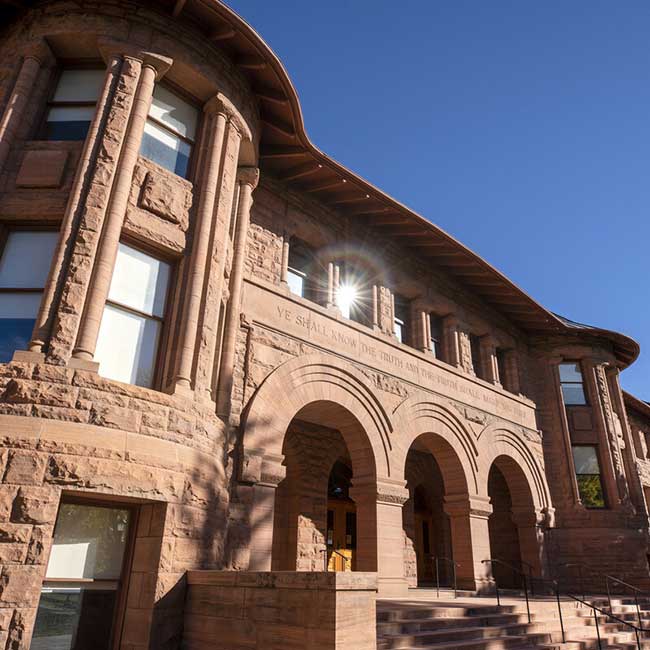When Colorado College launched its Antiracism Commitment in November 2019, it pledged the CC community to antiracism work spanning every department, division, and classroom — and most importantly, to sharing the heavy lifting of antiracism efforts. Every CC student, faculty, and staff member is responsible for carrying the work forward.
For some faculty, that work has included professional development. Over the Spring Semester, CC faculty have participated in workshops through the Professional Development Series on Antiracism, offered by the Crown Faculty Center’s Mandala Center for Change.
Guided by faculty and staff facilitators, the workshops are aimed at weaving equity, justice, and inclusion into life at CC.
“Every facet at CC should examine antiracism in practice,” says Drew Cavin, director of field study.
During Block 7, Cavin and Sarah Schanz, assistant professor of geology, co-led a workshop on Antiracism in Field Study that asked faculty to consider how to navigate challenges related to inclusion and identity during field trips and study abroad.
During the workshop, faculty brainstormed risks that students might face when their classroom is no longer on the CC campus, but in a foreign city or the great outdoors. They considered how a trans student might feel when faced with choosing a room assignment based on gender, and anticipated how to prepare students for unavoidable challenges — for instance, traveling to a country where cultural norms include misogyny, homophobia, assumptions of able-bodiedness, or anti-Blackness.
Faculty then walked through scenarios to determine strategies to anticipate and mitigate risks, and discussed strategies to prepare students for risks that might be unavoidable. It’s key, Cavin and Schanz say, to help students to plan ahead for challenges and build community, so that they can look out for each other.
“Field trips heighten and intensify every way of relating to the content,” Cavin says. “Extremely transformative experiences can happen in these settings, especially if you build in intentional, pedagogical structures.”
The work continued as Christina Leza, associate professor of anthropology, and Cayce Hughes, assistant professor of sociology, co-facilitated a second workshop in Block 7: Creating Safer Classrooms for LGBTQ+ Students.
The session opened with a discussion of dichotomies. Many current CC students grew up in a world with strong LGBTQ+ representation in media. They have a sophisticated understanding of gender identity and language surrounding it. Yet at the same time, they are bombarded with anti-LGBTQ+ rhetoric — and as issues and terminologies change, many faculty who want to support students are simply trying to keep up.
Leza and Hughes’ workshop overviewed the benefits and drawbacks of classroom management strategies related to identity, while inviting questions and input along the way.
“I think faculty care about equity, for the most part, and want their classrooms to be inclusive spaces,” Hughes says. “I also think, specifically around gender and sexuality, things change really rapidly. Oftentimes, we’re encountering students who are using different language than we’re familiar with in terms of identity, or who have experiences that some faculty may not be familiar with. I think it's important to give faculty a space to ask questions about things they don't quite understand, whether it's new terminology or new identity categories, and a space to learn strategies and tools to manage things that may come up in the classroom.”
For Hughes, it’s also important to dive deeply into one aspect of antiracism work — gender and sexuality — to better understand individuals holistically.
“Focusing on gender and sexuality without considering and centering race, ethnicity, class, ability, religion — all these other kind of identity categories — it doesn't reflect people's lived experiences,” Hughes says. “The most marginalized students at CC are those who have compounding, intersectional, marginalized identities. Those are the students who need the most support, and it requires an intersectional lens to understand their experiences.”
In some ways, the work of antiracism is complex and overarching. Its goal, says Hughes, is to “transform the institution at every level.”
But in other ways, the work is as simple as asking questions. Most importantly, the facilitators hope that faculty recognize they are not doing the work alone.
“The workshops in this semester’s Professional Development Series haven’t been about top-down instruction,” says Schanz. “They’ve been a time when we can all get together and think about how the critical components of our teaching here can be made better, be made antiracist and more inclusive.”
“The outcomes of these workshops are less about specific tools and strategies, and more about creating an orientation towards antiracism work as an ongoing process,” Hughes says. “It's about realizing that to do better, you have to continually do that self-reflexive, critical work on yourself, and in community with other people.”
After all, “simple” does not mean “easy.” But any task is easier with many hands to lighten the load.






